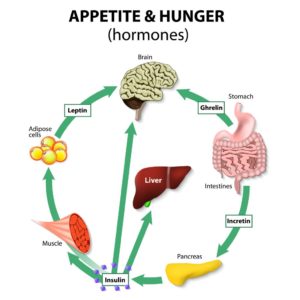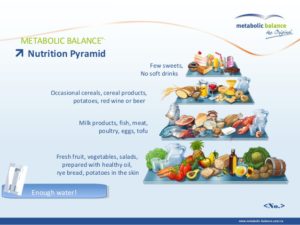
Many women struggle to get back to their pre-pregnancy weight. Some of the common reasons for this weight gain include poor eating habits, increased emotional stress, and less sleep, leading to prolonged hormonal imbalance.
According to the latest scientific research, the ability to lose weight is tied to the hormones. If the hormones are out of balance, it is very difficult to lose weight. Therefore, a whole foods diet plan, in order to get to the root cause of the problem, should be targeting hormonal imbalance.
Leptin and Ghrelin: The Appetite Regulating Hormones

The two main hormones that regulate the appetite are called ghrelin and leptin.
Leptin is a hormone produced by fat cells; it signals to the body to stop eating when it is full. However, there is a condition called leptin resistance which has become a very common problem. If a person is leptin resistant, the body produces leptin, but the brain stops listening and the appetite doesn’t drop. The body then goes into starvation mode and tries to increase fat stores. You are most likely leptin resistant to some degree if you have tried calorie restriction and/or exercise for weight loss with no success.
There are many factors contributing to leptin resistance. Recent research has shown that refined sugar, in the form of fructose (the type of sugar that is commonly found in fruit), is a major contributor to leptin resistance. Consuming whole fruits in moderation is healthy, but foods high in fructose, such as commercial fruit juice or foods containing high fructose corn syrup, should be avoided during any weight loss program that targets leptin resistance.
Most new parents are not getting enough sleep, and lack of proper sleep also contributes to leptin deficiency. During sleep, leptin levels will naturally increase. However, as is often the case with new parents, when one doesn’t get enough sleep, this leads to a lack of leptin in the body, which leads to increased hunger.
Ghrelin is a hormone secreted by the stomach when it’s empty. Ghrelin is in charge of telling the body when it needs to eat. During sleep, ghrelin levels will naturally decrease; sleep deprivation results in too much ghrelin in the system leading to increased hunger. Ghrelin levels (and hunger) can also increase in stressful situations, according to a medical study done at UT Southwestern Medical Centre. This same study found that ghrelin also functions as a mood regulator, which partially explains emotional eating. Most new parents probably have excess ghrelin in their system!
According to a study published in 2006, eating meals that have adequate amounts of protein leads to a greater feeling of satiety and lower ghrelin levels in the body. Yes, eat your veggies, but don’t forget to balance your salad out with adequate amounts of protein.
Insulin: The Hormone that Allows your Body to use Sugar
Insulin is a hormone secreted by the pancreas that allows your body to utilize sugar from consumed carbohydrates. The body’s cells need sugar for energy. After eating a meal, in order for the sugar to be absorbed by the cells, the pancreas secretes insulin. Insulin then sends a signal to cells to absorb sugar from the bloodstream.

With insulin resistance, the amount of insulin secreted is not sufficient to move glucose into the cells and the cells become resistant to insulin. To compensate, the pancreas secretes insulin in ever-increasing amounts, which leads to weight gain and eventually a host of other problems including type 2 diabetes, kidney problems, high cholesterol, etc.
Insulin resistance is triggered by the same thing that leptin resistance is triggered by: a diet high in fructose. For example, a study done in 2009 on mice showed that a diet high in fructose led to insulin resistance. Fructose in the form of high fructose corn syrup is a common ingredient found in many packaged foods and drinks. However, just cutting out foods high in fructose is not enough to combat insulin resistance because there is scientific evidence that the liver can also produce fructose from non-fructose containing carbohydrates. In fact, according to researcher Dr. Miguel Lanaspa: “Our data suggests that it is the fructose generated from glucose [found in grains, starches and many other major carbohydrates] that is largely responsible for how carbohydrates cause fatty liver and insulin resistance.” Therefore, there is ample evidence that limiting all carbs is key in order to effectively combat insulin resistance. Please note that for weight loss I do not advocate for ultra low carb diets, but instead advocate for a diet that limits carbs.
High-Quality Fats Balance Insulin Levels
Even though the latest research has shown that low carb diets are more effective for weight loss than low fat diets, most conventional North American health practitioners stubbornly continue to recommend low fat diets, the same diets they have recommended for the last 60 years, for weight loss. Clearly this advice isn’t and hasn’t been working because modern-day North Americans are on average more overweight than ever before in human history! In fact, our North American ancestors were altogether a lot healthier and on average weighed a lot less than before these modern low fat dietary guidelines were put into place in North America roughly 60 years ago.
Healthy fats that have been shown to combat insulin resistance include coconut oil and ghee. Coconut oil was used traditionally in India, but when Indians switched to the so-called “heart-healthy” fats such as sunflower and safflower oils, the incidence of diabetes and atherosclerosis skyrocketed. We can learn much from the wisdom of traditional cultures. A study done on animals in 2009 found that coconut oil protects against insulin resistance. The traditional fats butter and ghee (clarified butter) are rich in butyric acid, which has been shown to regulate insulin sensitivity. The consumption of olive oil has also been scientifically shown to combat insulin resistance.
Summary of Recommendations

To summarize, after pregnancy, if there are difficulties with losing weight despite calorie restriction and/or exercise then it is absolutely necessary to balance one’s hormones. The root of the problem is most likely leptin resistance, insulin resistance, and imbalanced ghrelin levels.
Lifestyle changes such as better sleep and a reduction in stress will combat leptin resistance so try to make that a top priority if possible. If lifestyle changes are simply not possible then there are dietary changes which will also produce results. Restricting carbs including fructose is a must. The consumption of high quality healthy fats will also assist. Eat high quality proteins in balanced portions along with your veggies.
References
“Clinical Scientist Sets the Record Straight on Hazards of Sugar” Dr. Mercola
“Fix Your Leptin” Wellness Mama
“Ghrelin: How to Control this Hunger Hormone to Lose Fat” Dr. Axe
“Is a Lack of Sleep Making me Fat? HowStuffWorks
“Leptin, Ghrelin and Weight Loss” Precision Nutrition
“Lowfat Diets” Weston A Price Foundation
“Why High-Fructose Corn Syrup Causes Insulin Resistance” Dr. Mercola
